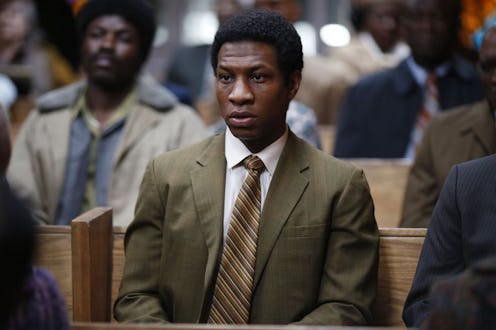Entertainment
"We" Is The Most Important Part Of 'When We Rise'

When We Rise premiered Feb. 27 and is spending four nights this week educating audiences on the LGBT rights movement. But it should be noted that the ABC miniseries premiered on Feb. 27, 2017 — making the show's focus on LGBT rights, the women's movement, and racial inequality especially resonant for its modern audience. And though as a young Ken Jones, Jonathan Majors' When We Rise role spans the '60s to mid-'80s, he tells Bustle that this history can teach us a lot about fighting for the future.
But first, we have to learn about the people who made this movement possible, and Majors felt some pressure to accurately portray Jones, a black gay man who came to San Francisco with the Navy and discovered a community there.
"When I first got the project, I thought, 'great story, it’s about people.' The gentlemen that I am being tasked to potentially play is human as hell and is dealing with a lot of trouble," he recalls. "As an actor, the responsibility to breath life into somebody else, that in and of itself is a huge responsibility. And then that compounded with that fact that we’re talking about potentially, the civil rights movement, also the gay rights movement, also the women’s rights movement, which are all kind of on my radar as a young person."
But about halfway through filming the series, Majors says, the cast realized just how timely this story had become. "What they were fighting for, who they were fighting for, it kind of exploded," he says. "Equal rights and civil rights for all, one struggle one fight, I completely agree with. And it was important. Now, it’s so relevant and so in many ways under attack."
Though there are challenges reflected in the series that we may feel exhausted as a society to be facing again and again, Majors thinks that When We Rise portrays many things that we can learn from and utilize today. "They wanted to be equal. You know, they want to be equal. I want to be seen as another human being on an equal footing. And they fought for that and they got it, to an extent," he says.
"Now, we’re 50 years later, right? Here we are, kind of, in the same — I don’t want to say the same, but we’re in a similar predicament, where there’s things that we’re coming up against. There are barriers that need to be crossed and broken down."
Because we're in such a "predicament" Majors believes that the "we" is the most important thing for viewers to get out of When We Rise. "We cannot be divided. Most of the biggest shifts that happen in policy ... The straw that broke the back, was usually when those organizations — the women's [movement], the gay rights movement, and the civil rights movement, and the black power movement — when any of those teams came together and became pluralized, that’s when change happened," he says.
"If we’re together, we have a hell of a chance. The power of the people is the most potent power that we have as citizens."
Additional reporting by Samantha Rullo